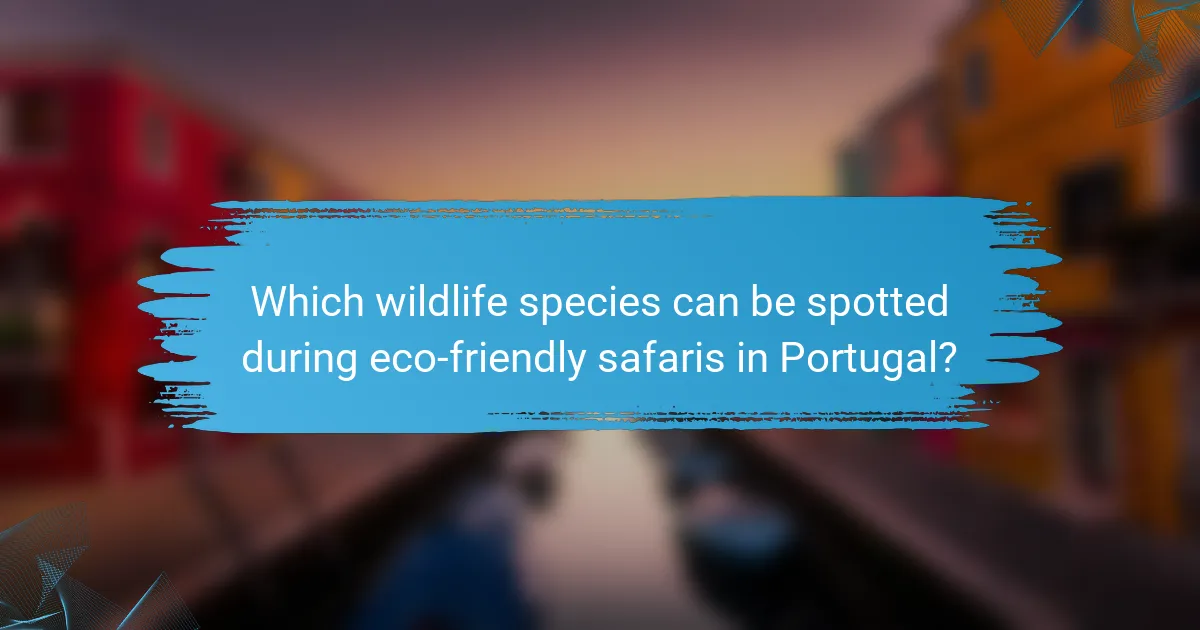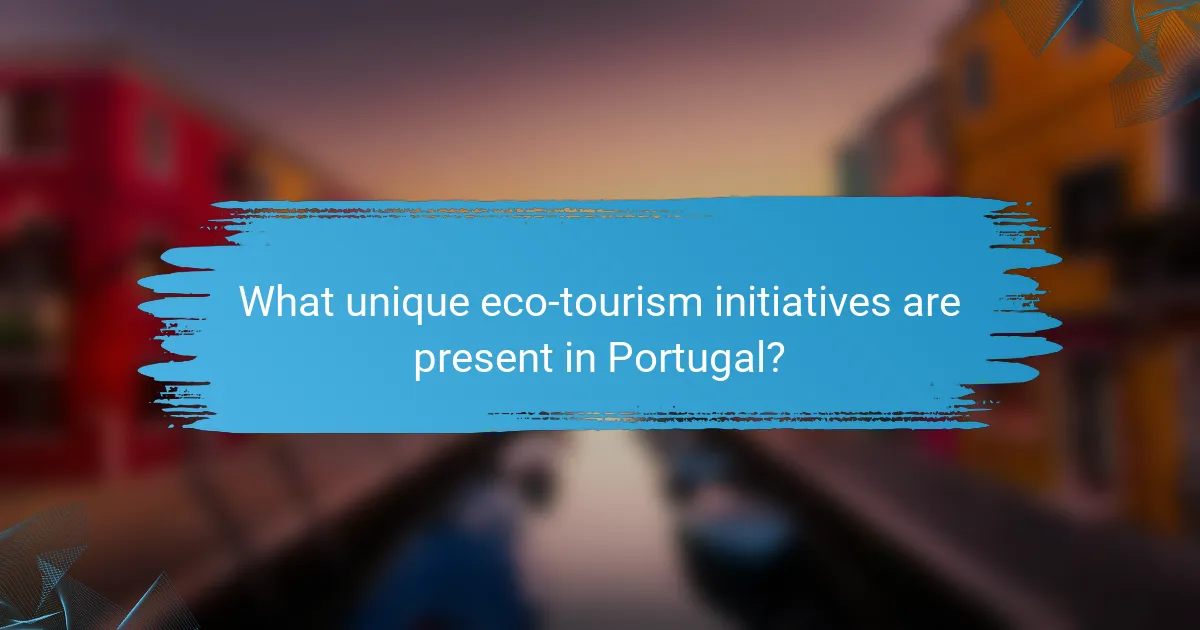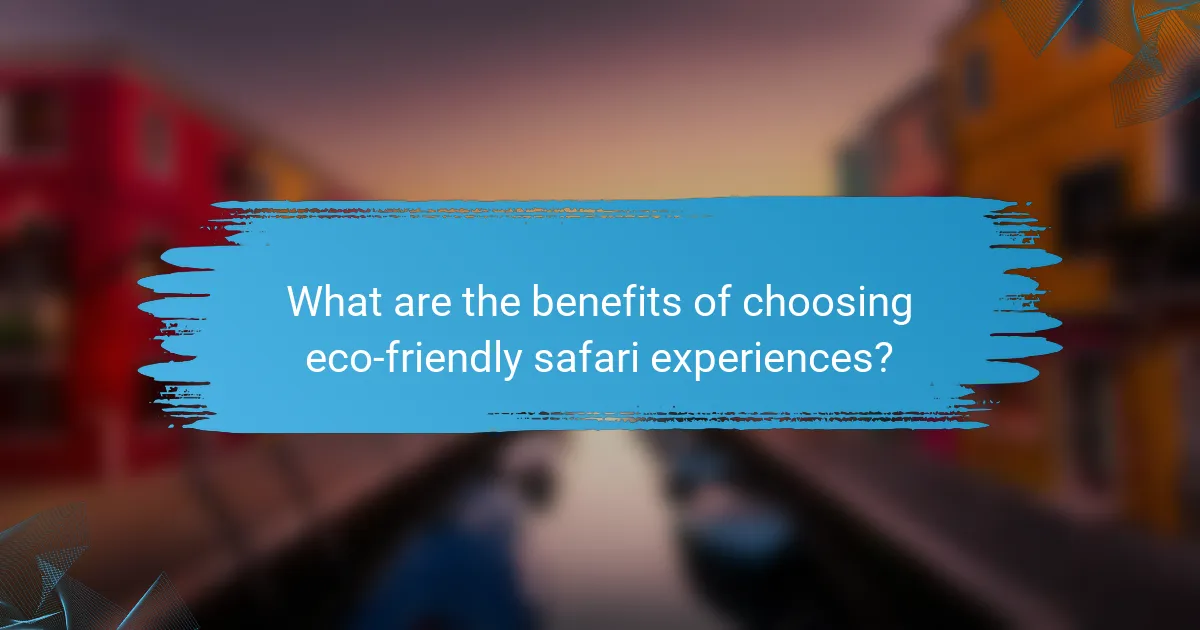Eco-friendly safari experiences in Portugal offer a sustainable way to explore wildlife while supporting local communities. These safaris prioritise minimal environmental impact, responsible wildlife spotting, and education about biodiversity. Visitors can enjoy unique encounters with species like Iberian wolves and experience the beauty of natural parks. Engaging in these eco-tourism initiatives fosters conservation efforts and enhances appreciation for Portugal’s diverse ecosystems.

What are the key principles of eco-friendly safari experiences in Portugal?
Eco-friendly safari experiences in Portugal prioritise sustainability and wildlife conservation. Key principles include minimising environmental impact, promoting local ecosystems, and supporting community-based tourism.
Operators often utilise eco-friendly vehicles and practices to reduce carbon footprints. Additionally, they engage in responsible wildlife spotting, ensuring minimal disturbance to habitats.
Collaboration with local communities fosters economic benefits and cultural exchanges. This approach enhances visitor experiences while promoting conservation efforts.
Education about local flora and fauna is integral, encouraging awareness and appreciation for biodiversity. These principles collectively contribute to sustainable tourism in Portugal.
How do sustainable practices enhance wildlife conservation?
Sustainable practices enhance wildlife conservation by promoting habitat protection and minimising human impact. Eco-friendly safari experiences in Portugal prioritise responsible tourism, ensuring wildlife thrives in their natural environments. These practices include using renewable resources, supporting local communities, and implementing conservation education. As a result, wildlife spotting becomes a rewarding experience that fosters appreciation for biodiversity while contributing to ecosystem preservation.
Why is local community involvement crucial for eco-friendly safaris?
Local community involvement is essential for eco-friendly safaris because it fosters sustainable practices and enhances wildlife conservation. Engaging local communities ensures that tourism benefits them directly, creating economic incentives to protect their environment. This collaboration leads to better wildlife management and preservation of natural habitats. Additionally, local knowledge enhances the safari experience, allowing for more authentic wildlife spotting and cultural exchange. By prioritising community involvement, eco-friendly safaris in Portugal can achieve long-term sustainability and environmental stewardship.

Which wildlife species can be spotted during eco-friendly safaris in Portugal?
Eco-friendly safaris in Portugal offer opportunities to spot diverse wildlife species. Common sightings include Iberian wolves, red deer, and various bird species like the griffon vulture and the Eurasian eagle-owl. Additionally, the unique Mediterranean flora supports a range of endemic species, enhancing the overall experience.
What are the best locations for wildlife spotting in Portugal?
The best locations for wildlife spotting in Portugal include the Algarve, Alentejo, and the Azores. These regions offer diverse ecosystems and abundant wildlife.
The Algarve features stunning coastal landscapes and is home to dolphins and sea birds. Alentejo’s vast plains support species like Iberian lynx and various migratory birds. The Azores, an archipelago, provides unique opportunities to see sperm whales and other marine life.
Eco-friendly safari experiences are available in these areas, promoting sustainable practices while enhancing wildlife observation. Visitors can engage in guided tours that prioritise conservation and respect for habitats.
How does seasonal variation impact wildlife visibility?
Seasonal variation significantly impacts wildlife visibility during eco-friendly safari experiences in Portugal. Different seasons influence animal behaviour, migration patterns, and habitat accessibility.
In spring, many species become more active, increasing visibility as they engage in mating rituals. Summer often brings more tourists, yet wildlife can be harder to spot due to dense foliage. Autumn allows for easier observation as animals prepare for winter, while winter can limit visibility due to migration or hibernation.
Understanding these seasonal dynamics enhances wildlife spotting opportunities and informs sustainable practices for responsible tourism.

What unique eco-tourism initiatives are present in Portugal?
Portugal showcases unique eco-tourism initiatives through eco-friendly safari experiences that prioritise sustainable practices and wildlife spotting. These initiatives include guided tours in natural parks, emphasising conservation and education.
The Algarve region features eco-safaris that allow visitors to observe native species like the Iberian lynx in their natural habitat. These tours often use electric vehicles to minimise environmental impact.
In the Douro Valley, sustainable wine tours incorporate wildlife observation, promoting biodiversity alongside local viticulture. Visitors learn about organic farming practices while enjoying the scenic landscape.
The Azores offer whale-watching tours that adhere to strict guidelines, ensuring minimal disturbance to marine life. These initiatives contribute to conservation efforts while providing memorable experiences for tourists.
How do local organizations promote sustainable safari experiences?
Local organisations promote sustainable safari experiences by implementing eco-friendly practices and engaging communities. They focus on responsible wildlife spotting, minimising environmental impact, and supporting conservation efforts. These organisations often collaborate with local communities to ensure that tourism benefits both wildlife and residents. Additionally, they educate tourists about the importance of sustainability, creating awareness of local ecosystems and wildlife conservation.
What role do eco-lodges play in enhancing safari experiences?
Eco-lodges significantly enhance safari experiences by promoting sustainable practices and fostering wildlife conservation. They provide eco-friendly accommodations that minimise environmental impact while offering immersive nature experiences. These lodges often prioritise local community engagement, ensuring that tourism benefits the surrounding areas. Additionally, eco-lodges frequently organise guided wildlife spotting tours, increasing the chances of observing native species in their natural habitats. By integrating sustainability into safari experiences, eco-lodges attract environmentally conscious travellers who value conservation efforts.

What are the benefits of choosing eco-friendly safari experiences?
Choosing eco-friendly safari experiences offers numerous benefits, including conservation of wildlife and habitats. These experiences promote sustainable tourism, reducing environmental impact while supporting local communities. Eco-friendly safaris often involve responsible wildlife spotting practices, ensuring minimal disturbance to animals. They also educate travellers on the importance of preserving ecosystems, fostering a deeper appreciation for nature. Additionally, many eco-friendly safari operators contribute to conservation efforts, helping to protect endangered species and their habitats.
How do eco-friendly safaris contribute to environmental preservation?
Eco-friendly safaris significantly contribute to environmental preservation by promoting sustainable tourism practices. These safaris minimise ecological footprints through responsible wildlife viewing and conservation efforts. They often support local communities, ensuring that tourism revenue benefits environmental initiatives. For instance, eco-friendly operators may invest in habitat restoration and anti-poaching programmes, leading to healthier ecosystems. Additionally, they educate tourists about biodiversity, fostering a greater appreciation for wildlife and conservation.
Which health benefits can travellers gain from nature immersion?
Travellers can gain improved mental well-being, reduced stress, and enhanced physical health from nature immersion. Engaging with natural environments during eco-friendly safari experiences in Portugal promotes relaxation and mindfulness. Studies show that spending time in nature can decrease anxiety and elevate mood. Additionally, wildlife spotting fosters a connection to biodiversity, encouraging conservation awareness.

What challenges do eco-friendly safaris face in Portugal?
Eco-friendly safaris in Portugal face several challenges, including habitat preservation, wildlife conservation, and community engagement. These factors impact sustainable practices and the overall success of wildlife spotting initiatives.
Habitat preservation is crucial as tourism can lead to environmental degradation. As a result, strict regulations are necessary to protect ecosystems. Wildlife conservation efforts often compete with agricultural and urban development, making it challenging to maintain biodiversity.
Community engagement is essential for successful eco-friendly safaris. Local communities must benefit from tourism to foster support for conservation efforts. However, there can be resistance due to a lack of awareness or perceived economic disadvantages.
Finally, the need for sustainable practices can increase operational costs for safari operators. Balancing affordability with environmental responsibility remains a significant hurdle.
How can travellers support sustainable practices during their safari?
Travellers can support sustainable practices during their safari by choosing eco-friendly tour operators, minimising waste, and respecting wildlife. Opt for accommodations that prioritise sustainability, such as those using renewable energy and local resources. Engage in responsible wildlife viewing by maintaining a safe distance and avoiding disturbances. Participate in conservation efforts through donations or volunteering. Lastly, educate yourself and others about local ecosystems and the importance of preserving them for future generations.
What are common misconceptions about eco-friendly safaris?
Common misconceptions about eco-friendly safaris include the belief that they lack adventure, are more expensive, and do not offer authentic wildlife experiences. Many assume that eco-friendly practices limit wildlife spotting opportunities. In reality, these safaris prioritise sustainable practices while providing thrilling encounters with nature. Another misconception is that eco-friendly options compromise comfort; however, many eco-lodges in Portugal offer luxurious amenities alongside their commitment to sustainability.

How can travellers prepare for an eco-friendly safari in Portugal?
Travellers can prepare for an eco-friendly safari in Portugal by researching sustainable tour operators, packing eco-conscious gear, and learning about local wildlife. Selecting accommodations that prioritise sustainability is essential. Engaging in responsible wildlife spotting practices enhances the experience while minimising environmental impact.
What gear and supplies are essential for an eco-friendly safari?
Essential gear for an eco-friendly safari includes sustainable clothing, reusable water bottles, biodegradable toiletries, and binoculars for wildlife spotting. These items minimise environmental impact and enhance the experience. Opt for lightweight and breathable fabrics to stay comfortable while respecting nature.
Which best practices should travellers follow to minimize their impact?
Travellers can minimise their impact during eco-friendly safaris in Portugal by following key best practices. Prioritise using local guides to support the community and reduce carbon footprints. Choose eco-friendly accommodations that implement sustainable practices. Avoid single-use plastics and bring reusable items. Respect wildlife by observing from a distance and not feeding animals. Participate in conservation initiatives to contribute positively to local ecosystems.
What tips do experts recommend for maximizing wildlife encounters?
To maximise wildlife encounters, experts recommend planning visits during early morning or late afternoon when animals are most active. Choose eco-friendly safari operators that prioritise conservation and respect wildlife habitats. Use binoculars for a closer view without disturbing animals. Maintain silence to avoid scaring wildlife away. Lastly, learn about local species to enhance your spotting skills and appreciation.